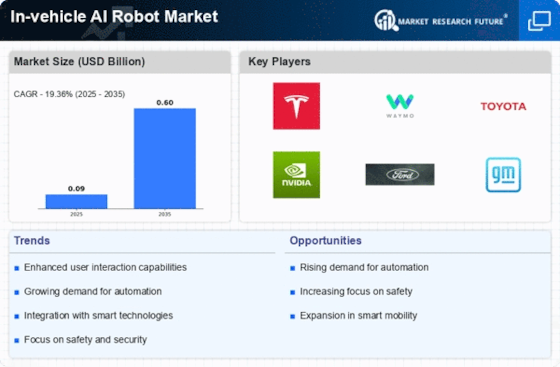Top Industry Leaders in the In vehicle AI Robot Market

*Disclaimer: List of key companies in no particular order
Top listed global companies in the In-vehicle AI Robot industry are:
Motional Inc.
Nauto Inc.
Horizon Robotics
AutoX Inc.
Argo AI
MG Motor
Predii Inc.
Refraction AI Inc.
Waymo LLC
Optimus Ride
Robert Bosch GmbH
Zoox Inc among others
Bridging the Gap by Exploring the Competitive Landscape of the In-vehicle AI Robot Top Players
The in-vehicle AI robot market, still in its nascent stages, holds immense potential for reshaping automotive experiences. This nascent market is characterized by a dynamic landscape with established players, nimble startups, and tech giants all vying for dominance. Understanding the competitive landscape is crucial for any company seeking to capitalize on this burgeoning market.
Key Players and Strategies:
Established Automakers: Leading car manufacturers like Tesla, Porsche, and GM are leveraging their existing production, distribution, and brand trust to develop in-vehicle AI robots. Tesla's Autopilot and Full Self-Driving (FSD) systems are at the forefront, while Porsche is partnering with Holoride to create immersive in-car VR experiences powered by AI robots.
Autonomous Driving Tech Companies: Waymo, Cruise, and Motional are pouring resources into developing Level 4-5 autonomous driving systems, with robotic elements playing a key role in decision-making and passenger interaction. Motional's ION, for example, is an AI-powered companion robot designed to enhance ride comfort and safety.
AI and Robotics Startups: Smaller companies like Embark, Nauto, and Refraction AI are bringing unique technology and functionalities to the table. Embark's Embark Trucks focuses on AI-powered self-driving trucks, while Nauto leverages in-vehicle cameras and AI to monitor driver behavior and prevent accidents.
Tech Giants: Players like Amazon, Apple, and Google are entering the fray through partnerships and integrations. Amazon's Alexa is being integrated into in-car systems, while Apple's CarPlay and Android Auto offer platforms for AI-powered features.
Factors for Market Share Analysis:
Technology Leadership: Companies with cutting-edge AI, robotics, and autonomous driving technology are likely to gain an edge. This includes advanced sensor fusion, robust algorithms, and secure data management capabilities.
Partnerships and Collaborations: Strategic partnerships with established automakers, tech giants, and other complementary players can accelerate market reach and product development.
Regulatory Landscape: Navigating the evolving regulatory environment around autonomous vehicles and AI safety will be crucial for market success.
Cost and Affordability: While premium features will drive initial adoption, broader market penetration hinges on developing cost-effective AI robot solutions.
Consumer Trust and Acceptance: Addressing public concerns around safety, data privacy, and ethical considerations will be key to widespread adoption.
New and Emerging Trends:
Personalization and Customization: AI robots are moving beyond basic functionalities to deliver personalized in-car experiences, catering to individual preferences and needs.
Voice and Conversational AI: Advanced voice assistants are enabling natural and intuitive interaction with in-vehicle AI robots, enhancing user comfort and safety.
Biometric Integration: Monitoring vital signs and emotional state can optimize comfort and provide proactive safety measures, paving the way for emotionally aware AI robots.
Augmented and Virtual Reality Integration: AR/VR experiences powered by AI robots can revolutionize in-car entertainment and communication, making journeys more immersive and engaging.
Cybersecurity and Data Privacy: Secure data handling and robust cybersecurity measures are paramount to mitigate concerns and build trust with consumers.
Competitive Scenario:
The in-vehicle AI robot market is currently witnessing intense competition across various segments. Established players are leveraging their resources and brand recognition, while startups are injecting innovation and agility. Collaboration and partnerships are becoming increasingly vital as companies seek to navigate the complex technological and regulatory landscape. The ability to adapt to evolving consumer preferences, integrate cutting-edge technology, and address safety and ethical concerns will ultimately determine the long-term winners in this exciting market.
Latest Company Updates:
Motional Inc.
- Date: October 26, 2023
- Source: Motional Press Release
- Development: Partners with Hyundai Motor Group to deploy autonomous robotaxis in South Korea by 2027.
Nauto Inc.
- Date: November 15, 2023
- Source: Nauto Blog
- Development: Launches "Nauto Driver Monitoring System" for commercial fleets, using AI to improve driver safety and prevent accidents.
MG Motor
- Date: November 29, 2023
- Source: MG Motor Press Release
- Development: Collaborates with SAIC and Alibaba to develop Level 3 autonomous driving technology for its vehicles in China.
Predii Inc.
- Date: October 25, 2023
- Source: Predii Website
- Development: Secures $50 million in Series B funding to expand its predictive maintenance platform for autonomous vehicles.
